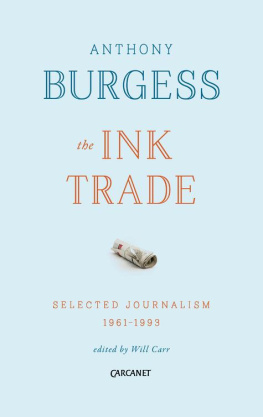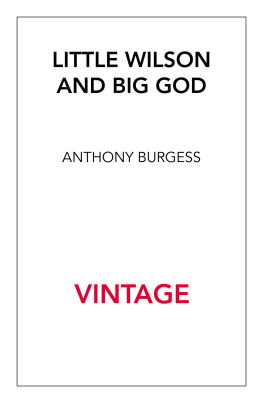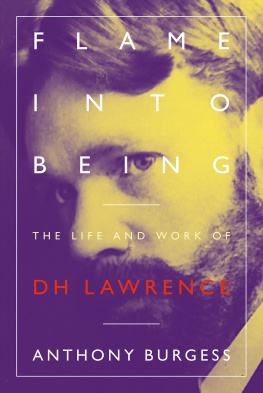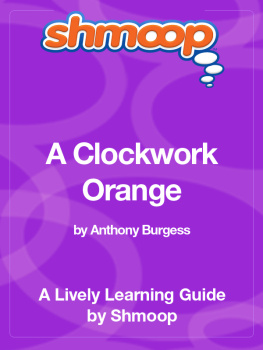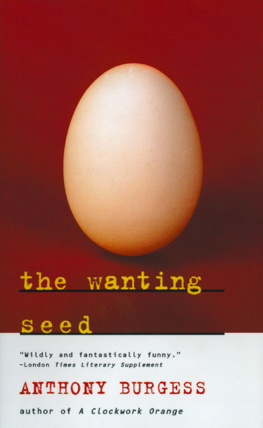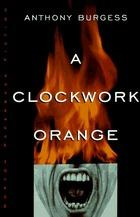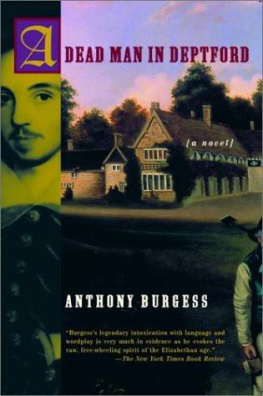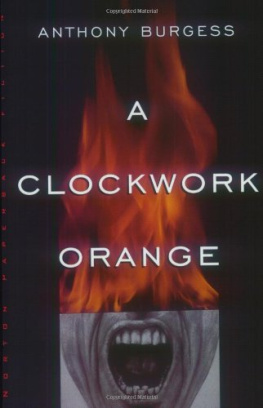Burgess Anthony - The Ink Trade: Selected Journalism 1961-1993
Here you can read online Burgess Anthony - The Ink Trade: Selected Journalism 1961-1993 full text of the book (entire story) in english for free. Download pdf and epub, get meaning, cover and reviews about this ebook. year: 2018, publisher: Lightning Source Inc.;Lives and Letters, genre: Art. Description of the work, (preface) as well as reviews are available. Best literature library LitArk.com created for fans of good reading and offers a wide selection of genres:
Romance novel
Science fiction
Adventure
Detective
Science
History
Home and family
Prose
Art
Politics
Computer
Non-fiction
Religion
Business
Children
Humor
Choose a favorite category and find really read worthwhile books. Enjoy immersion in the world of imagination, feel the emotions of the characters or learn something new for yourself, make an fascinating discovery.
- Book:The Ink Trade: Selected Journalism 1961-1993
- Author:
- Publisher:Lightning Source Inc.;Lives and Letters
- Genre:
- Year:2018
- Rating:4 / 5
- Favourites:Add to favourites
- Your mark:
- 80
- 1
- 2
- 3
- 4
- 5
The Ink Trade: Selected Journalism 1961-1993: summary, description and annotation
We offer to read an annotation, description, summary or preface (depends on what the author of the book "The Ink Trade: Selected Journalism 1961-1993" wrote himself). If you haven't found the necessary information about the book — write in the comments, we will try to find it.
The Ink Trade: Selected Journalism 1961-1993 — read online for free the complete book (whole text) full work
Below is the text of the book, divided by pages. System saving the place of the last page read, allows you to conveniently read the book "The Ink Trade: Selected Journalism 1961-1993" online for free, without having to search again every time where you left off. Put a bookmark, and you can go to the page where you finished reading at any time.
Font size:
Interval:
Bookmark:
A NTHONY B URGESSS newspaper career was a long one, and began when he was twelve years old. A drawing in the Manchester Guardian on 21 November 1929 by John Burgess Wilson (as he then was) of 261 Moss Lane East, Manchester was a winning entry in the Christmas Fathers and Mothers competition, and depicted his father Joseph Wilson sleeping in his armchair next to a bottle of whisky and a pipe. Poems in Electron the school magazine of Xaverian College, Rusholme followed; and his earliest book and theatre reviews were written while studying English literature at the University of Manchester between 1937 and 1940, where they appeared in Serpent, the student newspaper.
Burgess was conscripted into the army in December 1940 and served in the Royal Army Medical Corps and as musical director of a dance band. He was eventually posted to Gibraltar in 1943, where as well as his work as a teacher in the Royal Army Educational Corps he reviewed films for the Gibraltar Chronicle until his demobilisation in 1946. After shuttling between unfulfilling teaching jobs in England, Burgess and his first wife Lynne lived in Malaya and Brunei between 1954 and 1959 where he taught for the British Colonial Service, and it was then that he began to publish his first fiction. His career as a journalist began to flourish once again after they had returned to England and Burgess became a full-time writer.
From 1960 Burgess contributed regular articles to Country Life and the Listener, as well as anonymous reviews to the Times Literary Supplement. This work took place alongside the task of writing novels: by 1962, Burgess had published ten, including The Malayan Trilogy, The Right to an Answer, The Doctor Is Sick, The Worm and the Ring, Devil of a State, One Hand Clapping, The Wanting Seed and A Clockwork Orange.
From May 1963 Burgess was also the fiction critic of the Yorkshire Post, writing a fortnightly column on new novels. He had joined the paper in 1961, and in his time there contributed more than sixty articles about several hundred different books. One morning a book called Inside Mister Enderby by Joseph Kell appeared on the doormat of his house in Etchingham along with the regular parcel of five or six that Burgess was called upon to review, and he led with a not entirely positive notice of it in his next article. As quickly became apparent, Inside Mister Enderby was in fact by Anthony Burgess himself, writing under a pseudonym, and his mischievous review of it in retrospect could have been judged as a private joke invisible to all except Burgesss publishers. However, his subterfuge was discovered and reported in the diary column of the Daily Mail, and the Yorkshire Post promptly sacked him.
It does not seem that Burgesss review of himself was the product of arrogant hubris. In the second volume of his autobiography, Youve Had Your Time, he makes clear that he was under the impression that the books editor at the Yorkshire Post, Kenneth Young, was in on the joke as Burgess had warned him earlier that year that a pseudonymous novel was about to appear; indeed, Burgess had already been revealed as the author of Inside Mister Enderby a month before in a review in the Daily Telegraph, so his cover had long since been blown. The remarks he makes about Inside Mister Enderby, reprinted here as the first review, Poetry for a Tiny Room, are in any case hardly very complimentary about the qualities of the novel. Gore Vidal remarked at the time that the response of the Yorkshire Post was somewhat humourless: at least, he is the first novelist in England to know that a reviewer has actually read the book under review. Burgess later retold the story many times, as did others; a version appears in the final piece in this book, Confessions of the Hack Trade.
This notorious sacking was not the end of his journalistic career, of course. Dismissal from the Yorkshire Post did nothing to slow his prodigious output. Continuing his association with the Listener, he became its television critic; he continued to review books and write commentaries for the Times Literary Supplement; he began to contribute reviews to the Guardian from 1964, and later for the Observer, for which publication he wrote almost continuously until the end of his life. He became the theatre critic of the Spectator in 1965, and broadened his remit to include book reviews for that publication as well. He wrote for the Hudson Review, Encounter, American Scholar, the Times, the New York Times, and the Los Angeles Times.
Burgesss literary stature increased throughout the 1960s, with his journalistic writing taking place alongside the production of more novels (The Eve of St. Venus, Nothing Like the Sun, Tremor of Intent, Enderby Outside) and, increasingly, commissioned screenplays (some original, some based on his own novels, none of which went into production). His first television appearance was on the BBC in 1962, and he contributed to many radio programmes, including Womans Hour, Childrens Hour and The World of Books; his Desert Island Discs interview was broadcast on 28 November 1966. Burgess was perhaps one of the first writers to embrace television and radio as a way of establishing a public persona and communicating his ideas to a mass audience, and he would continue his media activities for many years to come.
As his reputation grew, and especially after the adaptation of his novel A Clockwork Orange into a film by Stanley Kubrick in 1971, Burgesss journalistic activities expanded still further as he defended his book on air and in print. As well as producing many pieces of writing about youth culture and violence, he commentated on almost all aspects of contemporary culture for publications across the world, including Rolling Stone, Le Monde, Corriere della Sera, Playboy, El Pas and many more. The breadth of the subjects that he covered was astonishing, going far beyond his areas of immediate knowledge and expertise to include writing about food, anthropology, jazz, the evils of taxation, architecture, feminism, Islam, and whatever else was demanded by the editor of the day. His greatest loyalty was perhaps to the Observer (my paper, as he called it), to which he contributed more articles than to any other single publication but Burgess would write for almost anyone, about almost anything.
This makes Burgesss journalism sound like the worst kind of hack work, knocked off quickly and clumsily for the money. Some of his pieces on more populist subjects, such as pieces on the royal family, the Moors Murderers or football hooliganism for the Daily Mail, on first reading seem slighter than his writing about literature but even here there are references to Shakespeare, Beethoven and Catholic theology that make the approaches taken entirely distinctive. It seems clear that Burgesss ability to write high-quality copy for many different readerships, while always combining sober judgment with a characteristic style and flair, contributed to the unending demand for his work from newspapers.
Nonetheless, Burgess was often anxious not to contradict the impression that his journalism was merely the work of a pen for hire. He made many claims that reviewing and other journalistic writing were subliterary activities and a distraction from the real business of writing novels; but how seriously to take these claims is not always clear, especially when they themselves are contained in articles for the newspapers. In a 1973 Viewpoint column for the Times Literary Supplement Burgess complains at length about the injustices visited upon journalists non-payment of fees by villainous editors, last-minute spikings of copy innocently sweated over by the nave and luckless writer and finishes by saying:
Font size:
Interval:
Bookmark:
Similar books «The Ink Trade: Selected Journalism 1961-1993»
Look at similar books to The Ink Trade: Selected Journalism 1961-1993. We have selected literature similar in name and meaning in the hope of providing readers with more options to find new, interesting, not yet read works.
Discussion, reviews of the book The Ink Trade: Selected Journalism 1961-1993 and just readers' own opinions. Leave your comments, write what you think about the work, its meaning or the main characters. Specify what exactly you liked and what you didn't like, and why you think so.

